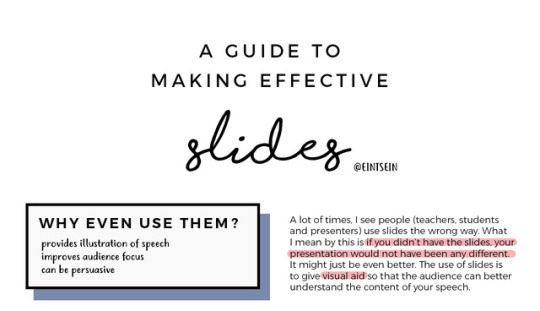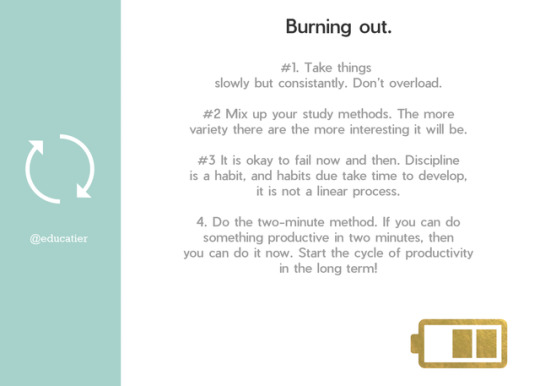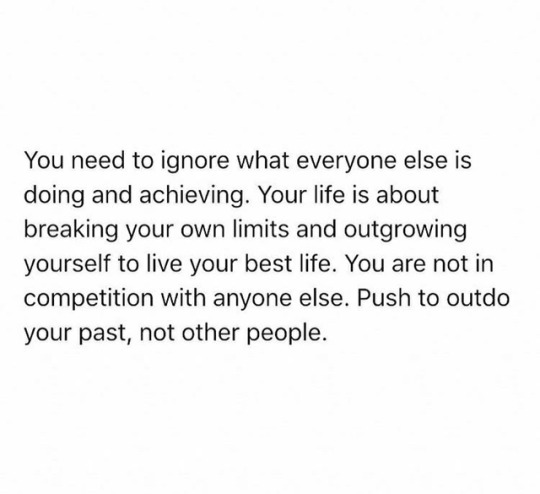Photo
I have a presentation at the end of the semester and we have to use slides, gotta keep this handy for reference.









A GUIDE TO MAKING EFFECTIVE SLIDES aka how to create presentation slides that actually improve your presentation
By Eintsein
(apologies for the variation in image quality. idk what went wrong with tumblr)
38K notes
·
View notes
Photo



{05.09.17} i kinda had productive day today!! spent the day at a really comfy cafe, (i even met someone cute there ah!!!!!) i managed to revise some biology, economics and a tiny bit of chemistry!! really hope for more productive days like these!!! 🌻
5K notes
·
View notes
Photo

2 notes
·
View notes
Text
24 Invaluable Skills To Learn For Free Online This Year
Here’s an easy resolution: This stuff is all free as long as you have access to a computer, and the skills you learn will be invaluable in your career, and/or life in general.
1. Become awesome at Excel.
Chandoo is one of many gracious Excel experts who wants to share their knowledge with the world. Excel excellence is one of those skills that will improve your chances of getting a good job instantly, and it will continue to prove invaluable over the course of your career. What are you waiting for?
2. Learn how to code.
littleanimalgifs.tumblr.com
Perhaps no other skill you can learn for free online has as much potential to lead to a lucrative career. Want to build a site for your startup? Want to build the next big app? Want to get hired at a place like BuzzFeed? You should learn to code. There are a lot of places that offer free or cheap online coding tutorials, but I recommend Code Academy for their breadth and innovative program. If you want to try a more traditional route, Harvard offers its excellent Introduction to Computer Science course online for free.
3. Make a dynamic website.
You could use a pre-existing template or blogging service, or you could learn Ruby on Rails and probably change your life forever. Here’s an extremely helpful long list of free Ruby learning tools that includes everything from Rails for Zombies to Learn Ruby The Hard Way. Go! Ruby! Some basic programming experience, like one of the courses above, might be helpful (but not necessarily required if you’re patient with yourself).
4. Learn to make a mobile game.
If you’re not interested in coding anything other than fun game apps, you could trythis course from the University of Reading. It promises to teach you how to build a game in Java, even if you don’t have programming experience! If you want to make a truly great game, you might want to read/listen up on Game Theory first.
5. Start reading faster.
Spreeder is a free online program that will improve your reading skill and comprehension no matter how old you are. With enough practice, you could learn to double, triple, or even quadruple the speed at which you read passages currently, which is basically like adding years to your life.
6. Learn a language!
With Duolingo, you can learn Spanish, French, Portuguese, Italian, or English (from any of the above or more). There’s a mobile app and a website, and the extensive courses are completely free.
Full disclosure: BuzzFeed and other websites are in a partnership with DuoLingo, but they did not pay or ask for this placement.
7. Pickle your own vegetables.
Tired of your farmer’s market haul going bad before you use it all? Or do you just love tangy pickled veggies? You too can pickle like a pro thanks to SkillShare and Travis Grillo.
8. Improve your public speaking skills.
You can take the University of Washington’s Intro to Public Speaking for free online. Once you learn a few tricks of the trade, you’ll be able to go into situations like being asked to present at a company meeting or giving a presentation in class without nearly as much fear and loathing.
9. Get a basic handle of statistics.
UC Berkeley put a stats intro class on iTunes. Once you know how to understand the numbers yourself, you’ll never read a biased “news” article the same way again — 100% of authors of this post agree!
10. Understand basic psychology.
Knowing the basics of psych will bring context to your understanding of yourself, the dynamics of your family and friendships, what’s really going on with your coworkers, and the woes and wonders of society in general. Yale University has its Intro to Psychology lectures online for free.
11. Make your own music.
Step one: Learn how to play guitar: Justin Guitar is a fine and free place to start learning chords and the basic skills you’ll need to be able to play guitar — from there, it’s up to you, but once you know the basics, just looking up tabs for your favorite songs and learning them on your own is how many young guitar players get their start (plus it’s an excellent party trick).
Step two: A delightful free voice lesson from Berklee College Of Music.
Step three: Have you always thought you had an inner TSwift? Berklee College of Music offers an Introduction to Songwriting course completely for free online. The course is six weeks long, and by the end of the lesson you’ll have at least one completed song.
Step four: Lifehacker’s basics of music production will help you put it all together once you have the skills down! You’ll be recording your own music, ready to share with your valentine or the entire world, in no time!
12. Learn to negotiate.
Let Stanford’s Stan Christensen explain how to negotiate in business and your personal life, managing relationships for your personal gain and not letting yourself be steamrolled. There are a lot of football metaphors and it’s great.
13. Stop hating math.
If you struggled with math throughout school and now have trouble applying it in real-world situations when it crops up, try Saylor.org’s Real World Math course. It will reteach you basic math skills as they apply IRL. Very helpful!
14. Start drawing!
All kids draw — so why do we become so afraid of it as adults? Everyone should feel comfortable with a sketchbook and pencil, and sketching is a wonderful way to express your creativity. DrawSpace is a great place to start. (I also highly recommend the book Drawing on the Right Side of the Brain if you can drop a few dollars for a used copy.)
15. Make your own animated GIF.
BuzzFeed’s own Katie Notopoulos has a great, simple guide to making an animated GIF without Photoshop. This is all you need to be the king or queen of Tumblr or your favorite email chains.
16. Appreciate jazz.
reddit.com
Have you never really “gotten” jazz? If you want to be able to participate in conversations at fancy parties and/or just add some context to your appreciation of all music, try this free online course from UT Austin.
17. Write well.
Macalester College’s lecture series is excellent. If you’re more interested in journalism, try Wikiversity’s course selection.
18. Get better at using Photoshop.
Another invaluable skill that will get you places in your career, learning Photoshop can be as fun as watching the hilarious videos on You Suck At Photoshop or as serious as this extensive Udemy training course (focused on photo retouching).
19. Take decent pictures.
Lifehacker’s basics of photography might be a good place to start. Learn how your camera works, the basic of composition, and editing images in post-production. If you finish that and you’re not sure what to do next, here’s a short course on displaying and sharing your digital photographs.
20. Learn to knit.
Instructables has a great course by a woman who is herself an online-taught knitter. You’ll be making baby hats and cute scarves before this winter’s over!
21. Get started with investing in stocks.
If you are lucky enough to have a regular income, you should start learning about savings and investment now. Investopedia has a ton of online resources, including this free stocks basics course. Invest away!
22. Clean your house in a short amount of time.
Unf$#k Your Habitat has a great emergency cleaning guide for when your mother-in-law springs a surprise visit on you. While you’re over there, the entire blog is good for getting organized and clean in the long term, not just in “emergencies.” You’ll be happier for it.
23. Start practicing yoga.
Most cities have free community classes (try just searching Google or inquiring at your local yoga studio), or if you’re more comfortable trying yoga at home, YogaGlohas a great 15-day trial and Yome is a compendium of 100% free yoga videos. If you’re already familiar with basic yoga positions but you need an easy way to practice at home, I recommend YogaTailor’s free trial as well.
24. Tie your shoelaces more efficiently.
It’s simple and just imagine the minutes of your life you’ll save!
252K notes
·
View notes
Text
40 Study Tips & Tricks
I thought to write down the “script” to one of my most viewed videos, with 40 study tips & tricks. It’s easier to read them and pass on the word!
Organization Tips:
1. Incorporate homework and classes in you daily planner – that will give you an overall glimpse of how your week will be about and how much time you need to spend in your studying sessions!
2. Color coordinate classes – be it notes, your planner, your textbooks or binders, pick a unique color for each class and work around the hues of that color to get more organized!
3. Make your own syllabus – if your professor doesn’t provide a syllabus for your class, try to make one before the school year working around your given textbooks or other given material.
4. Make study guides – make a study guide from your syllabus and draw before each topic two boxes: one for a midtest and one for the final test. When you have one of these tests, check the boxes when you’ve finished studying the chapter so you won’t miss anything!
5. Reference your material throughout – most of the times, we students work with in-class notes, textbooks and a syllabus. Since we get small bits of information here and there it’s important to reference every page throughout all your material so you can quickly access your information without having to flip endlessly through pages!
6. Keep a dashboard nearby – Whenever you use a notebook or a binder, make a dashboard on the first page with post it notes so you can quickly scribble any questions, homework or page numbers. When you get home, you just need to open your dashboard and attend those notes.
7. Print any tests, exercises and exams you can find – keep those in the end of your binder. These are perfect to practice before exams and tests because they really reflect what you will be tested about. Set an alarm clock for the deadline and start working on those!
8. Condense – organization disappears when you have too many of everything. Working with more than one planner in your life will make everything chaotic. If you think you need a second planner because you don’t have enough space to write in the first one, it’s because you don’t have available time as well. Don’t fool yourself and set achievable goals!
9. Customize your textbooks – most of the times, textbooks are formal books where information is hard to come by. Make your own tabs and write every chapter on them so they stick out – flag any charts, tables or graphics. Everything needs to be incredibly accessible!
10 Print a special planning sheet before finals: Organizing your studying by chapters and/or topics before finals is tremendously important since it lets you organize the amount of time you dedicate to each subject,
Study Sessions and Time Management
11. Save at least one afternoon or one morning a week for intensive studying. These is your “life-saver” – when you get so full of homework and projects that you can’t incorporate them into your daily academic routine, one free afternoon to organize your school life will really come in handy! Make an appointment with yourself!
12. Prepare in advance – although most professors may not ask you to prepare a class in advance, if you have the means to, go ahead. Grab a sheet and make a summary of the chapter your class will be about. Write the major topics and key information and take that guide to class. When your professor repeats previously studied information, you will be able to understand everything much better!
13. Never leave something behind – Even if you have a more light class, where professors don’t request homework or any side projects, don’t let that fool you! Be disciplined and be your own professors! Make your own projects and learn everything you can so you can nail those finals when they arrive.
14. Write your questions – most of the time, in a heavy study session, we come up with tons of questions and sometimes we just leave them behind. Write them down in your dashboard or a small notebook and ask your professors (personally or via e-mail). You can also ask your schoolmates in a facebook group created for that purpose!
15. Set an alarm clock and reward yourself – even if you study during an entire afternoon your studying will be pointless if you don’t take regular breaks. Set an alarm clock for one hour/one hour and a half and then take a 15 minute break. Never study for more than 2 hours straight! Even if you don’t notice, you’ll get less and less focused.
16. . Make a list – before each study session I like to grab my notepad and write down everything that I need to do before my session ends: the chapters I need to read, the pages I need to go through and the homework I need to complete. Sometimes I even write theses lists when I’m in college so I’ll have more determination to complete those tasks once I get home.
17 Work on the least interesting thing first. There are always classes or projects that we like the least – and those are the ones that we need to tackle first. You will start your studying session concentrated, which will let you go through the worst tasks faster.
18 Print, print, print. try to print everything you can and never study from your computer. Having your PDF files printed at hand will let you concentrate better, highlight and write some notes in the margins. You can take these everywhere with you and even turn them into small guides for future classes!
19. If you finish ahead, don’t quit. Perhaps the time you’ve saved for your study session has come to an end way before you have planned. That doesn’t mean you should stop right now – Take that time to review what you’ve learned so far or prepare other classes ahead of time!
20. Study in an organized space – make your own studying corner – bring everything you will need, from textbooks, binders and notebooks, to a cup of coffee and your computer. Keep them neatily organized on your desk so everything is at hand and on sight. Put on some soft background music (links down below) and adjust the lightning.
In class notes
21. If your professor provides PowerPoint slides before each class, print them (six or four per page) and bring them to class. Write in the margins and more throughout information in the back so it’s all condensed and tight. This is where you’ll take your notes. If you prefer to write on lined paper, think about copying some ruled paper to the back of your printed slides.
22. If your professor asks you to prepare your class in advance, try to make a small guide for each class. Open the comments column in MSWord and print the pages with that column. When you go to class, incorporate the in-class notes in that column, next to the relevant information so everything is nice and condensed.
23 If you are in a information-heavy class, try to adopt the Cornell method, which is the best, in my opinion, when you need to be a fast writer. There’s a video right here on how to use this method.
24. If you are in a bits-and-pieces class, which is that kind of class where the professor just gives a few key points and then gives practical examples or makes you work in group, try to adopt the box method – you can draw these boxes yourself or make them with post it notes – these are way more visual and perfect to memorize information.
25. Write in-class flashcards – if you don’t have flashcards around, make tiny flashcards on the top of your notes, where you cover the definitions you’ve written with the name of the definition. Each time you open your notes, try to remember the hidden definition. Automatic studying, every time!
26. Participate in class – nothing better than to be actively involved in your class discussion. For most of us, shy creatures, participating can be dreadful – but once you get out of your box, you’ll see how participating really makes you understand the subject!
27. If you have any questions during class, raise your hand and ask them. If your professor doesn’t like being interrupted, write them down and approach them in the end of the class. Sometimes, the little things we don’t understand are exactly the ones that come up on the final exam!
28. Ask for examples. Examples are probably the thing that makes your brain connect the information faster. If your professor isn’t keen on providing examples, suggest your own and see if your answer comes up right. Sometimes, examples are the thing that really makes us understand our material and our definitions, since they transform formal information into relatable events.
29. Sit at the front. It sounds too straightforward but sitting at the front really makes wonders. You won’t get distracted by what you classmates are doing, you will focus on the professor, who is right in front of you and you will resist the temptation of going to Facebook and Instagram during a boring presentation.
30. Write a brief summary at the end of the class. During those five minutes where everyone is dismissed and leaving the room, write a brief summary of that classes’ key points in the back of a page – this is fundamental in the Cornell method but can be used in any other method as well.
Finals Guide
31 Skim through your material two times: at first, you should start by studying your material starting from the end. The last lessons will be fresh in your memory and it’s very important to reinforce your knowledge on these while you can. In the second reading, you should start from the beginning, as usual. It’s important to make these two readings so you can go through the information in a much more flexible way.
32. Make a mindmap of each chapter. A mindmap is a chart that relates key words and important information, making it easy to understand the relationship and hierarchy between such key words. Use colors and images to memorize your material better. Oh, and don’t forget to check out my video on how to make mindmaps!
33. Read each of the titles and try to say out loud its contents, explaining each concept and the relationship between them. Imagine you are the teacher and are lecturing that subject to a crowd. If you skip any of the subjects, do it all over again. The more you repeat, the better you will memorize.
34. It’s time for some flash cards! Write the topic or the title on one side and the meaning or the explanation on the other. Try to cover as many topics or titles as you can and go through your cards while memorizing as best as you can each of the concepts. Try to do it backwards if you have time to do so!
35. On the day before the exam, skim through your mindmaps and flash cards again and always try to study while talking. Saying your content out loud will force your brain to relate information in a much more cohesive way and you’ll memorize everything much better.
36. Read the entire exam from top to bottom. Underline or circle any important words that you think will be crucial in you answer. After that, calculate how much time you should spend answering each question: this simple calculation will take only twenty seconds and will help you organize your time. Try to save five minutes at the end for revisions.
37. If you are solving a written exam and not multiple choice, try as much as possible to organize each answer in a structured way, saving two lines just to present your line of thought and writing each different argument in a different paragraph. Draft a conclusion at the end to underline the centre of your answer. Sometimes softly underlining some keywords is important to make your professor notice that you’ve correctly given importance to certain concepts.
38. Use these symbols for each question: one dot if you aren’t sure of the answer, two dots if you are sure of your answer and a circle if you are completely unaware of your answer. Start by answering any question with two dots; after those are all answered, go on through the two dots question. Leave the circle questions to the end – and ALWAYS answer them! Even if you don’t know what they’re about, who knows if you will be able to come up with something right?
39. Review your test one final time – many times, we make a lot of mistakes under stress and now is when you should spot them and amend them. This can be the difference between a B and an A!
40. Don’t take this too seriously – school is an important aspect of our lives but it isn’t everything. Failure comes many times and these failures can even drive you away from something that was simply not meant to be. Don’t stress out because everyone goes through the same!
25K notes
·
View notes





